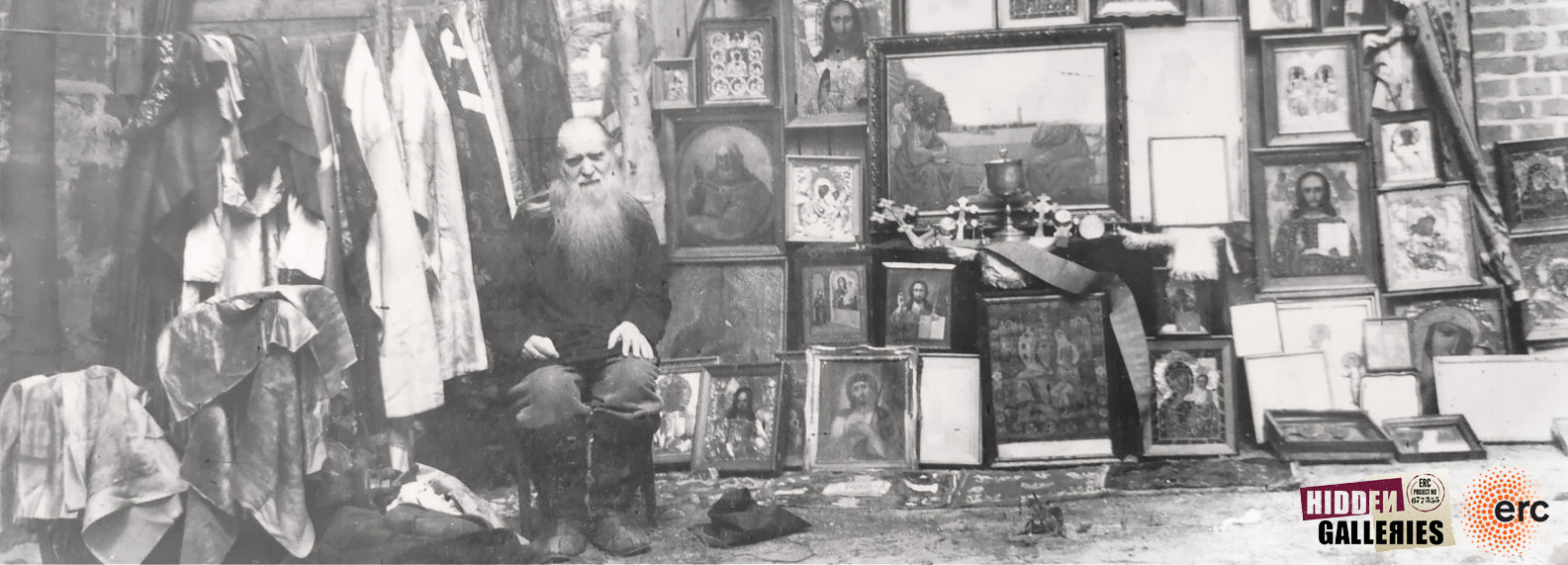National Council for the Study of the Securitate Archive
Item set
Title
National Council for the Study of the Securitate Archive
Consiliul Națiunal pentru Studierea Arhivelor Securității (CNSAS)
Description
1. History of Foundation
The National Council for the Study of the Securitate Archives, an institution known by its Romanian acronym CNSAS, represents the official authority that both administrates the archives of the former communist secret police in Romania and mediates public access to the files. The institution was established in 2000, after a decade of constant pressures for the opening of the secret police archives and the enforcement of lustration, with the promulgation of the Law No. 187/7 December 1999 on the acess to the personal file and the disclosure of the Securitate as a political police.
2. Legal Commission and Task
The Council has the following tasks: to ensure free access of individuals to their personal files devised by the former Securitate between 6 March 1945 and 22 December 1989; to disclose former agents and collaborators of the former Securitate; to provide the necessary documentation to the victims of the communist regime who are looking for rehabilitation and legal compensation; to approve the notifications that are due to be communicated to the individuals that have been vetted; to call for the declassification of the files and of other archival materials; to coordinate all educational and research activities conducted by CNSAS; to accredit researchers; to ensure the scientific collaboration and cooperation with similar institutions in Central and Eastern Europe, as well as with any other institution that is interested in researching the repressive mechanisms of the communist regime.
3. Material relevant to the study of religions
The archive’s total holdings currently amount to over two million volumes, the equivalent of approximately twenty-five kilometers. The archive is divided into multiple fonds, as follows: Documentary Fonds on particular issues, such as religion, art etc; Penal or Criminal Fonds, which consist of the files of the individuals that were put on trial; Network Fonds, the files of people who, one way or another, collaborated with the Securitate; Informative Fonds of those individuals that were put under surveillance; the Romanian Exile Fonds; Manuscripts Fonds, which contain the materials confiscated by the Securitate. Religion and religious issues are covered in the files of the Documentary Fonds and they reflect the policies and measures adopted by the Securitate towards religious communities in the form of orders, circular letters of the multiple headquarters of the secret police, statistics, reports, photographs, so on and so forth. The Informative Fonds, which include the surveillance files, also contain important information in relation to religious issues and individuals belonging to various religious communities. The main documents that could be found in such files are: reports, notes from informers, intercepted documents (letters, manuscripts), (confiscated) photographs/materials, declarations. The Penal or Criminal Fonds are the richest sources of religious materials, as they consist of the criminal files of those individuals who were arrested for their religious beliefs and activities.They contain interrogation notes, confiscated religious materials, confiscated photographs, personal letters etc.
4. Access for Researchers
Researchers can apply to become an accredited researcher with access to the reading room by following the application process outlined on the CNSAS website.
The National Council for the Study of the Securitate Archives, an institution known by its Romanian acronym CNSAS, represents the official authority that both administrates the archives of the former communist secret police in Romania and mediates public access to the files. The institution was established in 2000, after a decade of constant pressures for the opening of the secret police archives and the enforcement of lustration, with the promulgation of the Law No. 187/7 December 1999 on the acess to the personal file and the disclosure of the Securitate as a political police.
2. Legal Commission and Task
The Council has the following tasks: to ensure free access of individuals to their personal files devised by the former Securitate between 6 March 1945 and 22 December 1989; to disclose former agents and collaborators of the former Securitate; to provide the necessary documentation to the victims of the communist regime who are looking for rehabilitation and legal compensation; to approve the notifications that are due to be communicated to the individuals that have been vetted; to call for the declassification of the files and of other archival materials; to coordinate all educational and research activities conducted by CNSAS; to accredit researchers; to ensure the scientific collaboration and cooperation with similar institutions in Central and Eastern Europe, as well as with any other institution that is interested in researching the repressive mechanisms of the communist regime.
3. Material relevant to the study of religions
The archive’s total holdings currently amount to over two million volumes, the equivalent of approximately twenty-five kilometers. The archive is divided into multiple fonds, as follows: Documentary Fonds on particular issues, such as religion, art etc; Penal or Criminal Fonds, which consist of the files of the individuals that were put on trial; Network Fonds, the files of people who, one way or another, collaborated with the Securitate; Informative Fonds of those individuals that were put under surveillance; the Romanian Exile Fonds; Manuscripts Fonds, which contain the materials confiscated by the Securitate. Religion and religious issues are covered in the files of the Documentary Fonds and they reflect the policies and measures adopted by the Securitate towards religious communities in the form of orders, circular letters of the multiple headquarters of the secret police, statistics, reports, photographs, so on and so forth. The Informative Fonds, which include the surveillance files, also contain important information in relation to religious issues and individuals belonging to various religious communities. The main documents that could be found in such files are: reports, notes from informers, intercepted documents (letters, manuscripts), (confiscated) photographs/materials, declarations. The Penal or Criminal Fonds are the richest sources of religious materials, as they consist of the criminal files of those individuals who were arrested for their religious beliefs and activities.They contain interrogation notes, confiscated religious materials, confiscated photographs, personal letters etc.
4. Access for Researchers
Researchers can apply to become an accredited researcher with access to the reading room by following the application process outlined on the CNSAS website.
Website:
Creator
Iuliana Cindrea
Publisher
This project has received funding from the European Research Council (ERC) under the European Union’s Horizon 2020 research and innovation programme No. 677355
Date Created
January 2021
Items
-

Confiscated photographs belonging to an Old Calendarist monk
These two photographs were confiscated in 1936 by the police from an Old Calendarist monk, Gheorghe Ștefan Dorneanu, also known as father Grichentie. The first photograph shows Dorneanu dressed in monastic clothes in front of what seems to be a small house or a skete. The left and upper edges of the photograph contain a handwritten text that states: „Gh. Dorneanu (Grichentie) Valea lui Ion jud. Bacău mâna dreaptă a lui Andreescu Eustațiu,” which can be translated as „Gh. Dorneanu (Grichentie) Valea lui Ion, Bacău County, the right hand of Andreescu Eustațiu.” The second photo depicts a group o -

Confiscated camera and film roll Moldavian Catholic village, Romania
These photograph come from a surveillance file opened in 1974 on Sescu Petru, a local amateur historian and folklore collector from the Catholic village of Săbăoani (Szabófalva in Hungarian) who was suspected of "nationalist-chauvenist" activity. Sescu Petru belonged to the local Hungarian minority referred to as Csángós in Hungarian. In August 1974, Sescu Petru was visited in his home village by Laios Pușkaș (Puskás Lajos in Hungarian), a retired history and Latin teacher from Cluj (who we can see seated in the first image). According to the secret police, while they were visiting different -
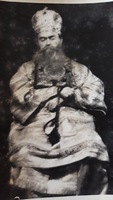
Photograph of and religious object belonging to a dead spiritual leader of the Old Calendarist Romanian Orthodox Church
The two photographs are related to the death of the Old Calendarist Romanian Orthodox Bishop Evloghie Oța and come as a result of extensive ethnographic fieldwork amongst Old Calendarist on-line communities and monasteries in Bucharest and Sibiu. The first picture represents Bishop Evloghie Oța before he was interred by his monastic brothers inside the underground church in Televiziunii street, 13 in February of 1979. From several descriptions given by informants of the Secret Police and in interviews with surviving witnesses, Bishop Evloghie Oța was interred sitting on the Bishop’s throne, dr -
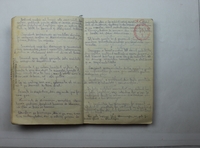
Religious poetry and aphorism from the Romanian Legionary group "the mystics"
The three images show the personal notebook of Constantin Voicescu (1924-1997) that was confiscated by the Securitate after his second release from prison (1954. It contains 33 aphorisms and 17 religious poems that circulated within the Communist prisons especially among the legionary group labeled by the Communist authorities as "the mystics". The notebook contains four pages of short sentences (aphorisms) written in black crayon about religious experiences, how to achieve personal redemption through self-sacrifice or the imminent victory of Christianity over the armies of Satan (Communism) -
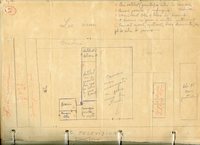
Plans of an underground Old Calendarist Orthodox house church Romania
The two images are part of an individual file opened by the secret police on Bishop Evloghie Oța of the Old Calendarist Orthodox Church following his release from prison in 1964 in the general Amnesty Decree. The images show house layouts that were drawn by the police during their surveillance operation. Two handwritten documents precede the two drawings of the house layouts. They are from two successive years and originate from the street/ local policemen (sectorist) that supervised the area where Bishop Evloghie Oța established his community and built his church in Televiziunii street. The -
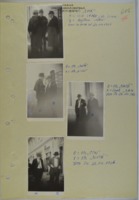
Surveillance photos of Greek Catholic bishop Ioan Dragomir Romania
These three pages of photo collages represent three instances in which Greek Catholic Bishop Ioan Dragomir was captured by secret police surveillance shortly after his release from prison in 1966. They all come from Dragomir’s individual file that extends to ten volumes. The first two collages are of photographs taken in stake out operations by Securitate officers from Maramureș county at the request of the central offices of the secret police. The officers had been instructed to map the network of persons Bishop Dragomir had contact with in his daily activities. These images consist of two -
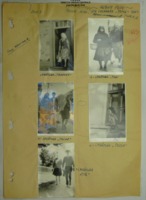
Surveillance of underground Greek Catholic believers Romania
This two-page collage of photographs represent Greek Catholic believers coming to underground services and meetings with Alexandru Todea the underground Greek Catholic bishop in Reghin, Mureș county in the mid 1960s. The images come from the informative file on Bishop Alexandru Todea that was opened upon his release from prison in 1964 as part of the general Amnesty Decree. The photo collage was sent by the Securitate officers from Mureș region to the central office in Bucharest with the description of the individuals represented in the pictures. The pictures were the result of a longer peri -
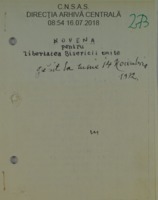
Novena for the freedom of the Greek Catholic Church Romania
In the early 1970s, during a raid and house search on Fr. Aurel Leluțiu, the officers found amongst other documents a typed prayer entitled "Novena for the freedom of the Greek Catholic Church". The prayer, however, is not included in Fr Leluțiu’s file. The four images presented here are selections from the same ten-page Novena preserved in Bishop Ioan Dragomir’s secret police individual file. The prayer was considered problematic by the Securitate with mentions of it being made in several other files. This Novena, a nine-day prayer exercise, is directed to the Virgin Mary to intermediate w -
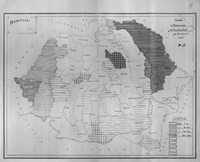
Map of Nazarenes and Inochentists created by the Romanian Siguranța
This map, which was created by the Romanian interwar secret police, the Siguranța, shows the distribution of two banned religious groups, Nazarenes and Inochentists. The map is undated but appears together with other materials from 1938. From the second half of 1938, the new Royal Dictatorship headed by King Carol pursued harsher policies towards religious sects and the Siguranța made a concerted effort to gather accurate data on sects in order to be able to plan operations and determine whether its actions were producing results. The data for maps such as this one was collected by local gend -
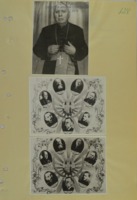
Postcards of Romanian Greek Catholic martyr bishops
These images are of postcards that circulated in the 1970s of the Greek Catholic bishops that refused the forced unification of their church with the Romanian Orthodox Church. The bishops were all arrested, imprisoned and either died in prison or in forced domicile. The two images show the Greek Catholic Bishops Ioan Suciu (1953), Valeriu Traian Frențiu (1952), Vasile Aftenie (1950), Ioan Bălan (1959), Alexandru Rusu (1963), Tit Liviu Chinezu (1955), and Cardinal Iuliu Hossu (1970). Their photos were then collaged together and artistically framed around an image of the Blaj Greek Catholic Cat -

Amnesty International postcards sent to imprisoned Greek Catholic bishop in Romania
The four images show Amnesty International postcards sent to Dej prison to the Greek Catholic Bishop Ioan Dragomir in 1964. They are selected from a total of 15 winter holiday postcards sent from various places in United Kingdom and Australia to Dej prison. Most of them have standardized typed messages on the Amnesty International cards. The first picture shows the inside of a card and back of an envelope. The card is a standard pre-written Amnesty International card to which the sender added: “I hope you will soon be free. God be with you.” The sender was the secretary of the University Col -
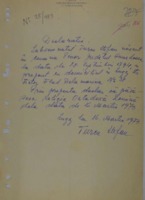
Letters renouncing membership of the Romanian Orthodox Church
The four images are of letters from members of the Romanian Orthodox Church community expressing their desire to leave the church. The almost identical, handwritten, signed and dated (spring 1973) letters were sent to the Romanian Orthodox parish in Lugoj. The second and third letters were written by the same person on behalf of different family members. The authors inform the Orthodox Church in Lugoj that they are leaving the Orthodox Church. The final letter, which was written in the name of an entire family, states that if by mistake they were registered as children with the Orthodox Chu -

Images of clandestine Greek Catholic services in Transylvania
The four images illustrate the religious life of a Greek Catholic community in 1970s Transylvania as recorded by the community in photographs and how it is described by the Securitate on the basis of their surveillance and investigation of the community. These materials represent a rare instance where it has been possible to relate secret police descriptions to photographic materials that can still be found in the community. The first three images come from the private collection of Mihai and Ana Rus and form part of a group of photos related to their regular attendance at religious services -
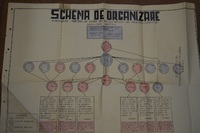
Secret police network scheme of Jehovah’s Witnesses in Romania
This network scheme comes from a documentary file on Jehovah’s Witnesses in the former administrative region of Cluj. Titled as “Organisation Scheme of the organisation “Jehovah’s Witnesses” in Cluj Region, it shows the structure of the group with names, ranks and connections of each of the functionaries (indicated by circles). The blue box at the top stands for the national leaders, while the rectangular boxes at the bottom represent the six territorial units in the region with the number of their subunits and members. The scheme also informs the viewer of the progress the authorities had ma -
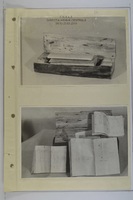
Crime scene photographs from a file on Jehovah’s Witnesses in Romania
These crime scene photographs were selected from a documentary file on Jehovah’s Witnesses in the former administrative unit called Cluj region. The pictures were taken during various house searches conducted by the secret police in the homes of Jehovah’s Witnesses or people related to them. The photos in the first image show a "normal sized piece of firewood" with its inside carved out and the reports of the Huedin circuit (territorial unit within the Jehovah's Witnesses organisation) from 1951–1954 that were hidden inside it. It was found in the home of the already arrested Huedin circuit se -
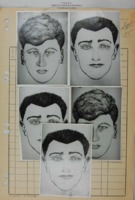
Romanian secret police investigative methods Operation Leaflet
The four images of documents selected here come from a documentary file on the “Catholic problem” and represent clues and evidence used by the Secret Police in order to identify the culprit who wrote a leaflet that requested that at a certain hour on the feast of the Virgin’s Ascension all Greek Catholics, Roman Catholics and friends of the Church should go into the former Greek Catholic churches and say a prayer so that God would grant Nicolae Ceaușescu wisdom to legalize the Greek Catholic Church. The four documents come from volume 6, 10 and 39 of the file and represent forensic sketches us -
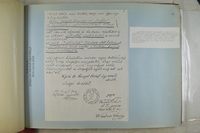
Confiscated stamp of a Hungarian Calvinist Church Choir in Romania
The first image comes from a photo album compiled by the Securitate on the Hungarian Calvinist Church Choir in the town of Ocna Sibiului (Vízakna). It shows a photocopy of a confiscated document, the last page of the choir’s president’s celebratory speech performed at the choir’s 80th anniversary. As with many of the group’s documents, it bears the official stamp of the choir. The second photo shows a document with a hand drawn replica of this stamp. This document, which is the last page of a handwritten copy of the choir’s Rules and Regulations from 1974 (its original was written in 1956), is -
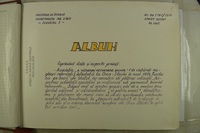
Secret police photo album on a Hungarian Calvinist Church Choir Romania
These images come from a photo album compiled by the Securitate on the Hungarian Calvinist Church Choir in the town of Ocna Sibiului (Vízakna), Transylvania. The first image shows the title page of the album with a short introduction to the choir and its supposed activity. In the second image, we can see photos which were most probably taken by the secret police displaying the decorated walls of the choir’s meeting place. The third image includes shots taken in the usual fashion of crime scene photographs of items confiscated from the choir during a secret police raid. The fourth image shows c -
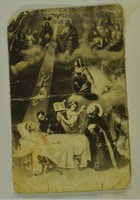
Small Icon belonging to Romanian Old Calendarist believer
These images depicts a small icon that was confiscated by the secret police from an Old Calendarist believer. The first image shows the front of the icon, which portrays what seems to be the fight between good and evil, the holy trinity, angels, saints, numerous religious symbols, as well as two priests that are praying for the soul of a dying man. The second image shows the back of the small icon which has a short text. The first part of the text is indecipherable, but the second part states: “[...] Pray this prayer and feel that fear comes into your blood and body. Look at the dead man and h -

Confiscated religious material smuggled into Romania
These photos were taken in 1984 and depict religious materials that were confiscated from three West German citizens who were trying to smuggle them into Romania. The first photo depicts the inside of the trailer that the tourists were driving. The material was carefully hidden inside it so that it would not be easily discovered by the Customs Officers. Based on the report that was attached to the photos, the materials were found in a specially designed place in the ceiling of the trailer. The second and third photos depict all the materials that were confiscated from the German citizens. Am -

Photographs of confiscated religious materials smuggled into Romania
These photos were taken in 1985 and show the search by Customs Officers of a car belonging to three tourists who were trying to cross the border into Romania. This was a normal procedure and any attempt to smuggle religious materials into the country was considered dangerous and an attack against the regime. The first image depicts the three tourists together with all the religious material that they were presumably hiding in their car. Among the books we can see a few Bibles, brochures, calendars, some cassettes and songbooks. These materials were confiscated along with the list of names of -
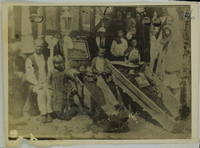
Photo of a funeral of two Old Calendarist believers Romania
This photograph was taken in 1934 or 1935 in the village of Toporăști in the county of Vaslui. It depicts the funeral of two victims of the Romanian Gendarmerie following an attack on their church in an attempt to arrest the community's priest. The first image shows a few Old Calendarist believers surrounding the coffins of two people, a man and a woman. They seem to have two icons placed on their chests and we can see that three of the children present in the photo have their hands on the coffins, implying that this is their parents' funeral. There is a short note on the right edge of the p -
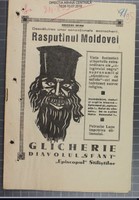
Brochure combating Old Calendarist ideas Romania
These four images are part of a brochure written in or around 1936 by Grigore Spiru, a well known Romanian journalist of the interwar period. The brochure, whose main characters are Glicherie Tănase and his alleged mistress, Maria Gârleanu, was meant to combat Old Calendarist ideas and to portray the Stilists (referring to "old style"), as Old Calendarists were referred to, in a negative manner. The first picture depicts the cover of the brochure, entitled “The Rasputin of Moldova. Glicherie, the holy devil and the Stilist bishop”, as well as a caricature of Glicherie. The comparison with th -

Confiscated group photograph of Inochentists Romania
This confiscated photograph was included in a personal file of an Inochentist leader alongside several others collated by the Romanian Securitate. The image shows the male leader flanked by two women from the community. Such group and community photographs feature heavily amongst the corpus of confiscated images in the secret police archives in Romania as for the secret police they were a convenient means of tracing networks and personal relationships of the religious underground. The case file does not state when the images were confiscated but from an Informer Report that appears elsewhere -
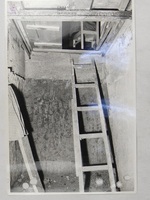
Images of Old Calendarist underground church in Bucharest
The 4 images are taken from a secret police personal file and were used as evidence of an Old Calendarist underground monastery in Bucharest. The community was led by the Old Calendarist bishop Evloghie Oța. According to the communist state legal framework, the Old Calendarist Orthodox Church was an illegal entity. These pictures documented a sweep operation of the secret police that ended in the destruction of the underground church and the arrest of the bishop. We cannot date the pictures precisely because the community kept rebuilding the underground chapel and the secret police destroyed -

Incriminating photographs on Old Calendarist underground community Bucharest
The two photographs are part of an evidence file of an underground Old Calendarist community. They are successive images of a typewriter and the typewriter with its owner taken by the Securitate for an evidence file constructed against the underground group. The first photograph has the typewriter placed near a Kalimavkion (monastic head gear in the Orthodox Church) which visually links the object with the owner. They are placed in the dormitory on the bed and what appears to be some literature is visible next to the typewriter. The second picture presents the owner of the typewriter with the -

Confiscated Tudorist songbook Bucharest
This songbook is located in a police file from 1938 and it appears to have been confiscated from two Tudorist believers, both of whom were women, who were distributing brochures, calendars and other religious literature to various people on the street. The images uploaded are the front cover and the contents page of a 30 pages long book. The first image depicts the cover of the book which has the name “Tudor Popescu”, the founder of the religious group and its title, Christian Songs (Cântări creștinești). The number “47” refers to the total number of songs that are contained in the songbook -

Mugshot of Old Calendarist monk Glicherie Tănase Romania
These mugshots were confiscated in 1952 by the Securitate from Onofrei V. Onofrei, an Old Calendarist monk, who was also the secretary of the Old Calendarist community. The mugshots of Glicherie Tănase, one of the most important Old Calendarist leaders, were taken in 1936, when he was arrested after the first confrontations between the Old Calendarists and the state authorities in Neamț county. He was arrested again, in 1952, and numerous attempts were made by members of the group to set him free. According to the penal file of Onofrei V. Onofrei, described as one of the youngest members of -
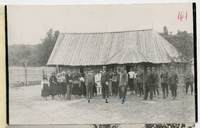
Destruction of Romanian Old Calendarist Church in Cucova
These photographs were taken in 1935, in the village of Cucova, in the county of Putna (nowadays Bacău), as evidence of the rebellions and problems caused by the Old Calendarists in the region. The term "Stilists" was also used by the state and the press in order to label them, referring to the fact that they were following the "old style" dates and calendar. The first image depicts some gendarmes, a few members of civil authorities and mainly women members of the Old Calendarist community, all of whom were arrested. The photograph was taken in front of the Old Calendarist wooden church, wh -

Confiscated photograph of Old Calendarist nuns Romania
This photograph was confiscated in 1941 by the Siguranța, the Romanian secret police prior to Communism. It depicts four Old Calendarist nuns, also referred to as Stilists. A short handwritten text on the reverse states that it was taken on September 1st, 1939. The nuns are dressed in standard monastic clothes, their heads are covered and their black tunics entirely cover their bodies. In their hands, they hold “metaniere”, Eastern Orthodox prayer ropes. The “metaniera” is an important part of monastic dress and is used during prayer to aid concentration. The composition of the photograph and
